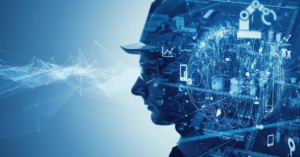Artificial Intelligence in marketing is no longer experimental. It is a foundational pillar of modern strategy. Brands across sectors and geographies are embracing AI to personalize experiences, automate tasks, and gain real-time insights. Whether you are a business strategist in Bangalore or a growth marketer in Berlin, understanding AI’s influence is essential in remaining competitive and contextually relevant.
In this article, we explore how AI is transforming the marketing landscape, how to align your content with AI-driven algorithms, and what tools can help you stay ahead.And if you are curious about the frameworks that combine traditional thinking with new-age tools, here’s a perspective on what engineered marketing really means.
What Is AI in Marketing?
AI in marketing involves using machine intelligence to automate decisions, analyze massive datasets, and improve campaign outcomes. It includes systems that learn and evolve, providing marketers with tools that adapt to consumer behavior, intent, and context.
Some of the primary technologies powering AI in marketing include:
- Machine learning models
- Natural language processing
- Predictive analytics
- Image and voice recognition
- Generative AI
This evolution has moved marketing from being reactive to being predictive and proactive.
Why Is AI Taking Center Stage in Marketing?
Traditional marketing is struggling to keep up with the scale and speed of today’s consumer interactions. AI solves that challenge by processing more data than a human ever could and acting on it in real time.
Here are some reasons why AI is gaining dominance:
- It delivers real-time content personalization
- It predicts customer behavior with surprising accuracy
- It enhances ROI by automating testing, segmentation, and delivery
- It makes sense of unstructured data, including social media, voice search, and heatmaps
AI allows for creative execution with scientific precision, creating a perfect balance between art and analysis.
Key Applications of AI in Marketing
Understanding where and how AI fits into your marketing function is critical. Here are the most impactful areas.
1. Content Creation and Optimization
AI tools assist in writing articles, generating headlines, creating summaries, and optimizing for search engines. They identify intent behind queries and suggest relevant topics based on semantic analysis.
What used to take days of keyword research and manual edits can now be enhanced by AI-driven content planning and optimization engines. However, it is still important to pair automation with human judgment for tone and authenticity.
2. Search Intent and Voice Search Compatibility
Voice search has changed how users phrase queries. Instead of typing “best marketing strategy 2025,” people ask, “What’s the best way to market a small business in 2025?”
AI models power the natural language understanding behind voice assistants. Marketers need to structure their content for these questions using clean headers, answer-style formats, and contextual cues.
This alignment with Answer Engine Optimization (AEO) improves the chances of being selected as a voice result.
3. Predictive Customer Journeys
AI models predict how leads move through funnels, identifying drop-off points, conversion triggers, and re-engagement tactics. This allows for journey orchestration that adapts in real time.
For instance, based on a user’s interaction history, AI can deliver content that aligns with their readiness to convert, even before they explicitly indicate interest.
4. Dynamic Personalization
From email subject lines to website copy and push notifications, AI helps personalize messaging at scale. It considers user history, behavior, location, and device to deliver highly relevant experiences.
This is particularly useful for geo-targeted campaigns where user needs vary city by city or even neighborhood by neighborhood.
What Are the Best Tools for Optimizing Content for AI-Driven Search Results?
While the specific tools are evolving constantly, the underlying principles remain consistent. Here are core functionalities to look for when optimizing content for AI-first environments:
Semantic Keyword Mapping
Use tools that go beyond traditional keywords and understand semantic clusters. These identify related terms, intent categories, and topical depth that voice assistants and AI algorithms prefer.
Content Scoring Engines
Platforms that provide readability, tone, and SEO health scores help bridge the gap between machine preference and human readability.
Natural Language Optimization
AI-based editors can help structure your content to answer specific user questions clearly, using formats like FAQs, bullet points, and conversational tone. These formats are highly compatible with AI crawlers and voice assistants.
Schema and Structured Data
Even though it’s technical, structured data helps AI understand your content’s purpose. Implementing FAQ schema, how-to schema, and article schema enhances visibility in featured snippets and answer boxes.
Predictive Analytics and Testing
Tools that use AI to suggest content topics, forecast campaign performance, or recommend adjustments based on search trends are invaluable in planning content calendars.
Building AI-Ready Content: A Checklist for Marketers
Before you publish your next blog or landing page, run through this list to ensure AI compatibility:
- Have you answered a clear user question within the first 100 words?
- Does your content align with voice search phrasing like “how,” “why,” and “best way to”?
- Is your content structured with proper H1 to H6 hierarchy?
- Are location-specific cues or use cases mentioned?
- Have you included related terms and synonyms naturally?
- Did you implement structured data or schema markup?
- Is the content optimized for both machine readability and human engagement?
These factors ensure your content is both algorithm-friendly and audience-ready.
Final Thoughts: AI Is Not Replacing Marketers, It Is Redefining Them
Artificial Intelligence is not taking away the creative soul of marketing. It is simply upgrading the toolbox. The best results happen when human intuition meets machine precision.
As search evolves, users are no longer just typing keywords—they’re asking complete questions, expecting personalized answers, and navigating across devices and locations. The marketers who understand this shift and structure content for it will lead the next generation of digital strategy.To understand how a blended approach can help businesses evolve their marketing foundation, you may also explore the concept of Engineered Marketing—a model that merges modern tools with timeless logic.







